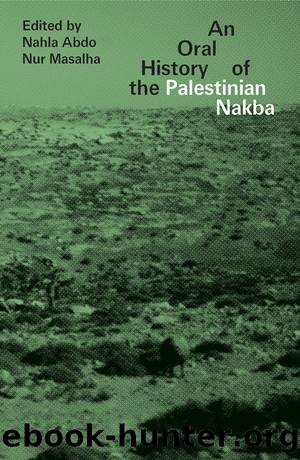An Oral History of the Palestinian Nakba by Abdo Doctor Nahla; Masalha Nur;

Author:Abdo, Doctor Nahla; Masalha, Nur;
Language: eng
Format: epub
Publisher: Zed Books
Published: 2018-08-14T16:00:00+00:00
7
Gender representation of oral history: Palestinian women narrating the stories of their displacement
FAIHA ABDUL HADI
The paper is based on highlighting the voices of Palestinian women who were displaced from Palestinian cities and villages in 1948 as a primary source,1 adopting the methodology of oral history from a gender perspective.
This multidisciplinary perspective is premised on the interaction between the researcher and the narrator (Tonkin 1995), and a deep knowledge of women’s psychology (Gluck and Patai 1991); at the same time, it acts on deconstructing the dominant values, which fail to recognize the experiences of women as a major component in history making. Thus a new set of values would be formed, allowing the integration and harmonization of the experiences of women and men (Hoda 1999: 168).
By telling their stories, women become visible and their voices are raised to express what they experience, know and go through. When we listen to the voices of women we can discern what is common in their stories regarding the “year of displacement”, as well as the differences emanating from their different social class and the different human experience they had in each town that they were displaced to. By listening to the hidden, honest and unheard voice of women, we can also understand the power relations between men and women and among the women themselves.
In order to allow the hidden voices of the narrators to emerge, and in order to listen to their honest and true opinions regarding what had happened to them from the year of displacement until the date of recording the interviews, the research adopted the gender perspective whereby the researchers listened patiently and attentively to the women. They observed and recorded the elements surrounding the narrators, and documented the body language: the eyes, the mouth, the lips, the hands, the feet and their eyebrows, in addition to documenting the long and short moments of silence. They shared with the narrators the concerns, dreams and pain that they experienced with the same sense of intimacy as when the narrators talked about the suffering of the past. While it is true that the researchers followed a research questionnaire, this served only as an outline that helped them probe some critical issues regarding the question of displacement. However, what was central to the methodology was its interest in allowing the narrators the opportunity to start talking from the angle that they preferred when remembering the past, so that their choices would help reveal which experiences and feelings were major and central to the past for them (Al-Dajani and Soliman 1995).
This interaction and communication between the researchers and the narrators is what could contribute to the generation and building of shared knowledge regarding the displacement in 1948, which might sometimes be aligned with the written Palestinian narrative and differ at other times, but certainly and necessarily adds new dimensions to it.
THE LIVING MEMORY OF PALESTINIAN WOMEN
The Palestinian women narrated their memories regarding the displacement of 1948. Through their eagerness to render a very accurate and detailed account of the events, the women described every detail of what affected their families.
Download
This site does not store any files on its server. We only index and link to content provided by other sites. Please contact the content providers to delete copyright contents if any and email us, we'll remove relevant links or contents immediately.
| Africa | Americas |
| Arctic & Antarctica | Asia |
| Australia & Oceania | Europe |
| Middle East | Russia |
| United States | World |
| Ancient Civilizations | Military |
| Historical Study & Educational Resources |
The Battle of Mogadishu by Matt Eversmann & Dan Schilling(700)
The Confidence Men by Margalit Fox(651)
The Spymaster of Baghdad by Margaret Coker(624)
A History of the Muslim World since 1260: The Making of a Global Community by Vernon O. Egger(619)
Jack the Ripper and the East End by Peter Ackroyd(585)
Empire of Fear: Inside the Islamic State by Andrew Hosken(566)
The Afghanistan File by Prince Turki AlFaisal Al Saud(553)
The Crimean War by Winfried Baumgart(547)
Akhenaten by Dominic Montserrat(540)
The Jerusalem Diamond by Noah Gordon(535)
Islam At The Gates: How Christendom Defeated the Ottoman Turks by Diane Moczar(532)
A Concise History of Greece (Cambridge Concise Histories) by Richard Clogg(528)
The History of Jihad by Robert Spencer(527)
Beirut 2020 by Charif Majdalani(514)
Israel: Ancient Kingdom or Late Invention? by Daniel I. Block(513)
Enemy in the East by Rolf-Dieter Müller(512)
The Privatization of Israeli Security by Shir Hever(501)
Destroying a Nation: The Civil War in Syria by Nikolaos van Dam(495)
The Nine Lives of Pakistan by Declan WALSH(493)
